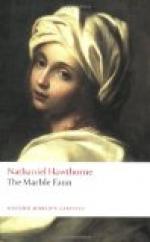Yet, if he could have beheld the scene with his clear, natural eyesight, he might still have found both merriment and splendor in it. Everywhere, and all day long, there had been tokens of the festival, in the baskets brimming over with bouquets, for sale at the street corners, or borne about on people’s heads; while bushels upon bushels of variously colored confetti were displayed, looking just like veritable sugar plums; so that a stranger would have imagined that the whole commerce and business of stern old Rome lay in flowers and sweets. And now, in the sunny afternoon, there could hardly be a spectacle more picturesque than the vista of that noble street, stretching into the interminable distance between two rows of lofty edifices, from every window of which, and many a balcony, flaunted gay and gorgeous carpets, bright silks, scarlet cloths with rich golden fringes, and Gobelin tapestry, still lustrous with varied hues, though the product of antique looms. Each separate palace had put on a gala dress, and looked festive for the occasion, whatever sad or guilty secret it might hide within. Every window, moreover, was alive with the faces of women, rosy girls, and children, all kindled into brisk and mirthful expression, by the incidents in the street below. In the balconies that projected along the palace fronts stood groups of ladies, some beautiful, all richly dressed, scattering forth their laughter, shrill, yet sweet, and the musical babble of their voices, to thicken into an airy tumult over the heads of common mortals.
All these innumerable eyes looked down into the street, the whole capacity of which was thronged with festal figures, in such fantastic variety that it had taken centuries to contrive them; and through the midst of the mad, merry stream of human life rolled slowly onward a never-ending procession of all the vehicles in Rome, from the ducal carriage, with the powdered coachman high in front, and the three golden lackeys clinging in the rear, down to the rustic cart drawn by its single donkey. Among this various crowd, at windows and in balconies, in cart, cab, barouche, or gorgeous equipage, or bustling to and fro afoot, there was a sympathy of nonsense; a true and genial brotherhood and sisterhood, based on the honest purpose—and a wise one, too—of being foolish, all together. The sport of mankind, like its deepest earnest, is a battle; so these festive people fought one another with an ammunition of sugar plums and flowers.
Not that they were veritable sugar plums, however, but something that resembled them only as the apples of Sodom look like better fruit. They were concocted mostly of lime, with a grain of oat, or some other worthless kernel, in the midst. Besides the hailstorm of confetti, the combatants threw handfuls of flour or lime into the air, where it hung like smoke over a battlefield, or, descending, whitened a black coat or priestly robe, and made the curly locks of youth irreverently hoary.




